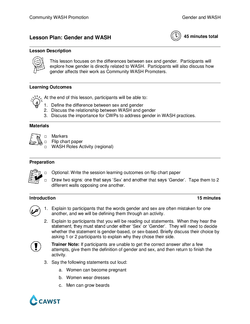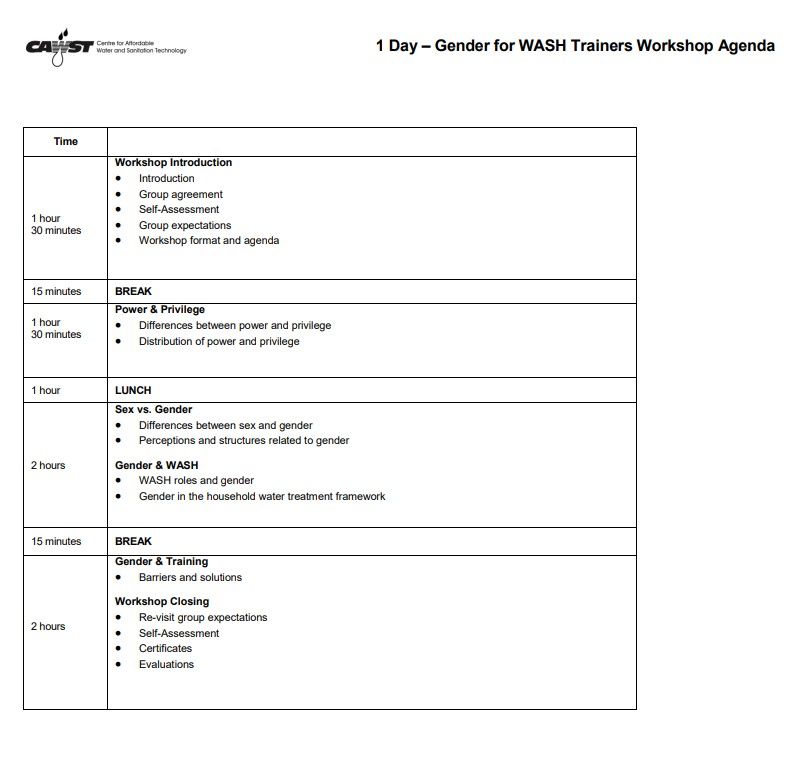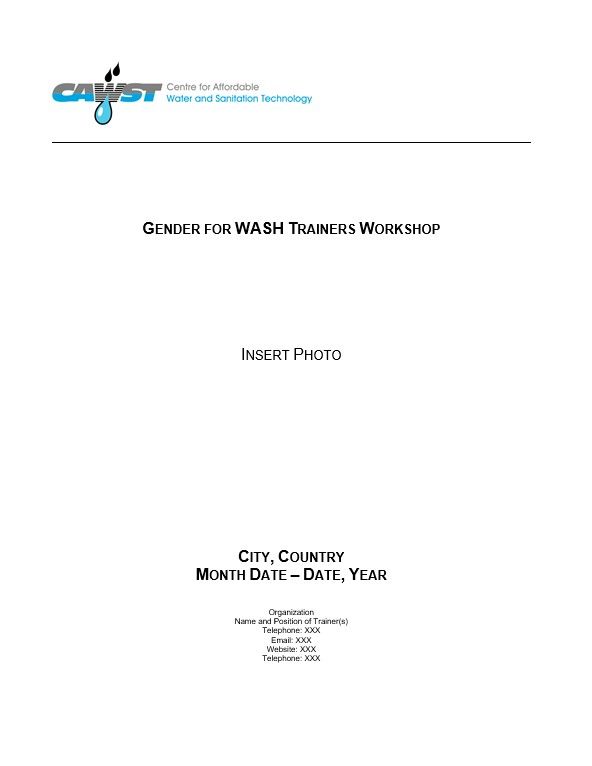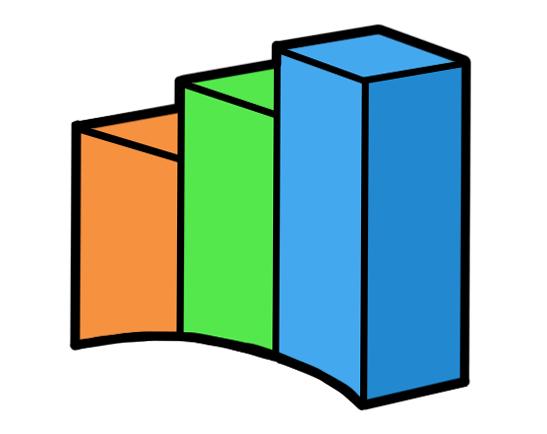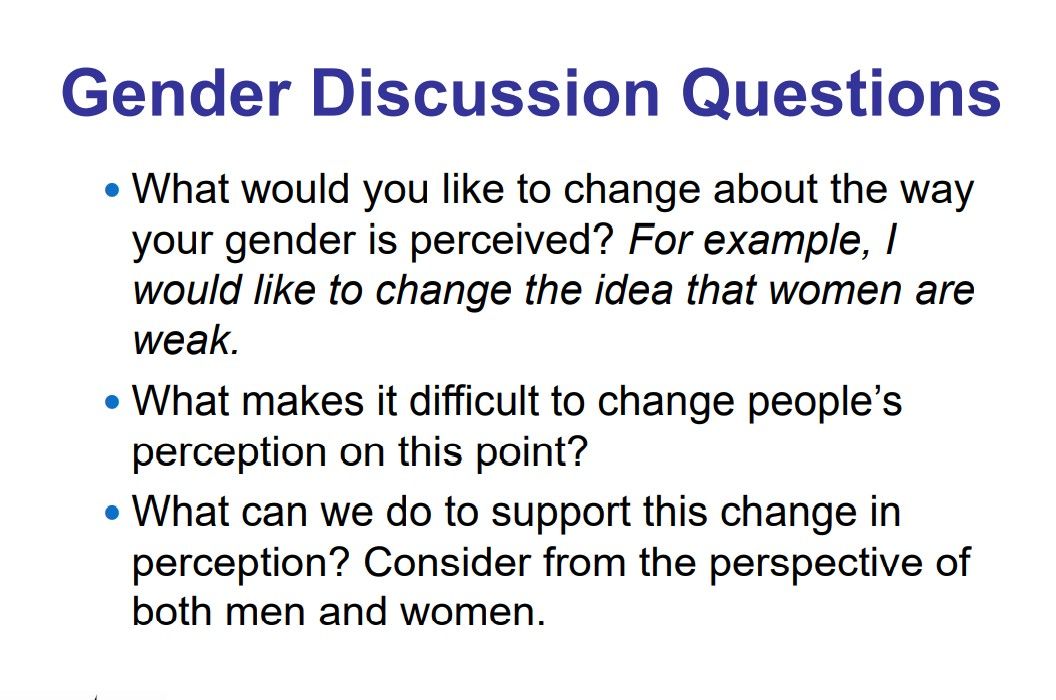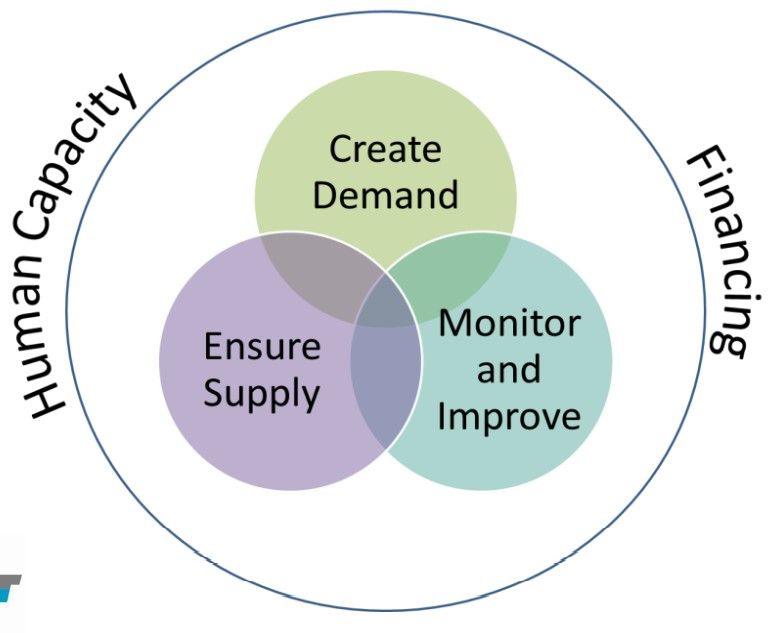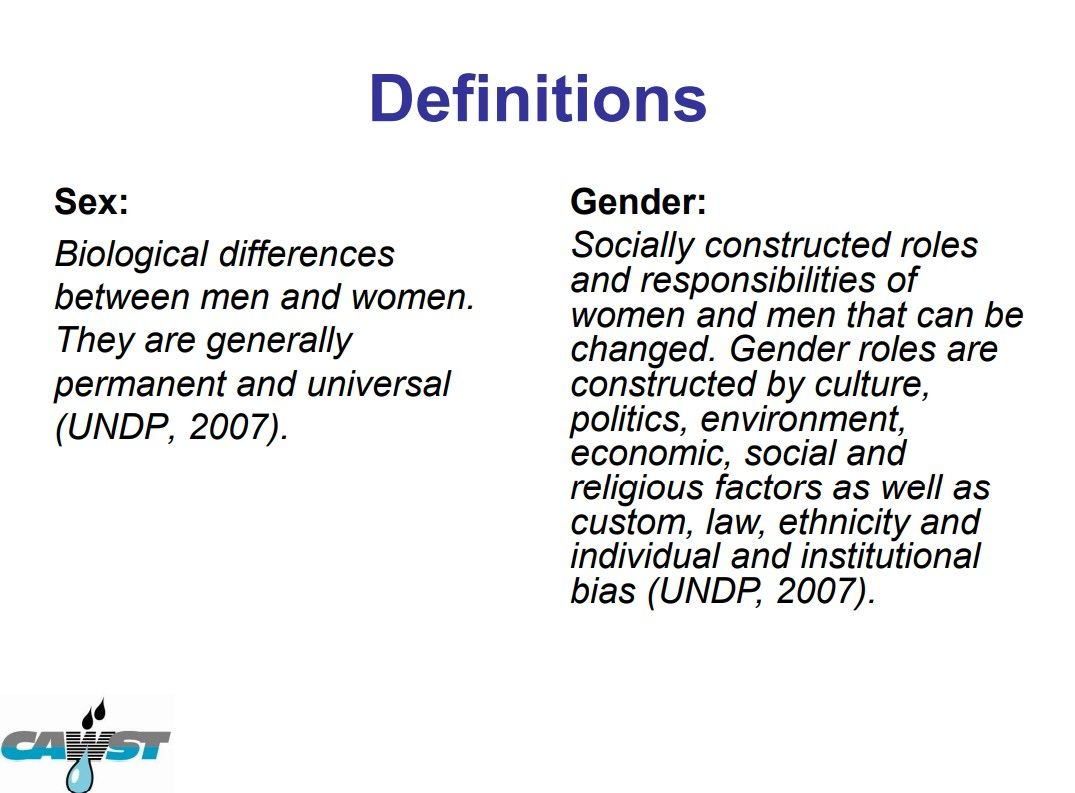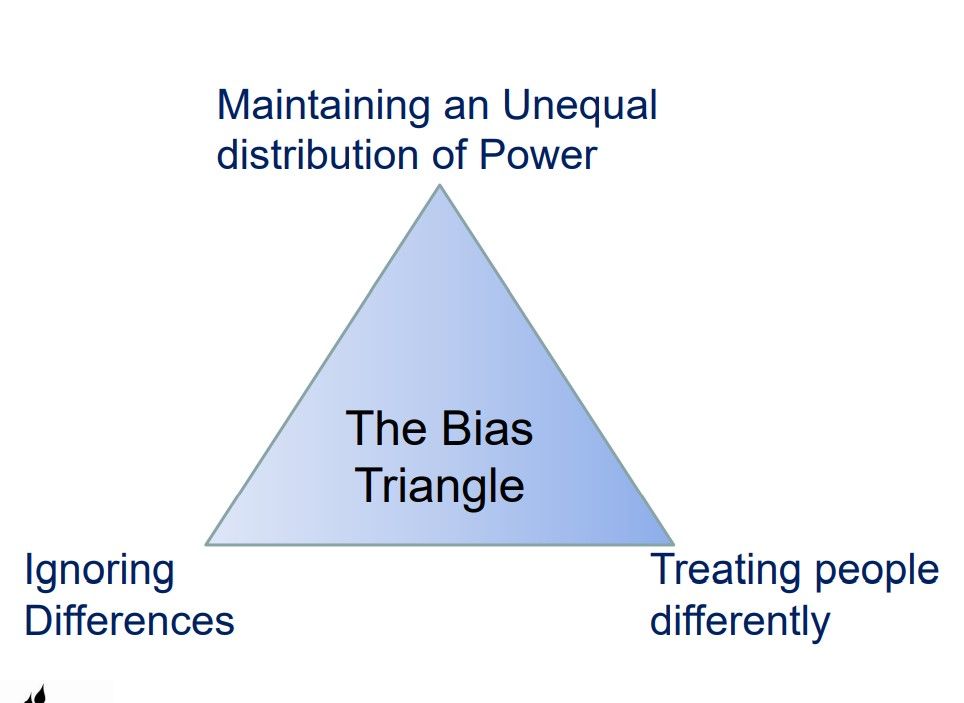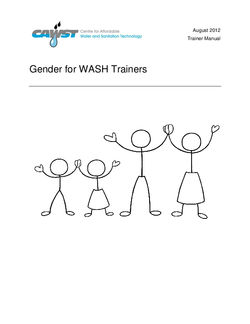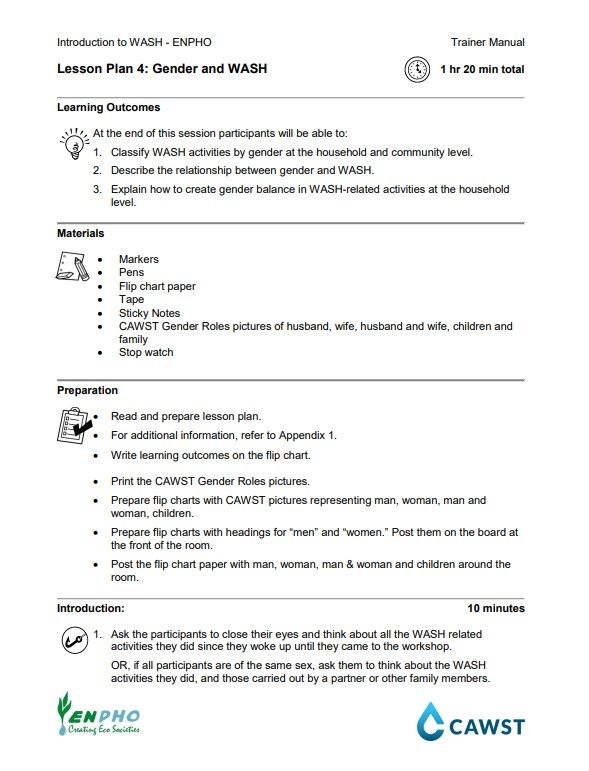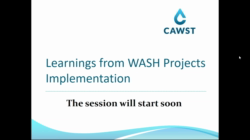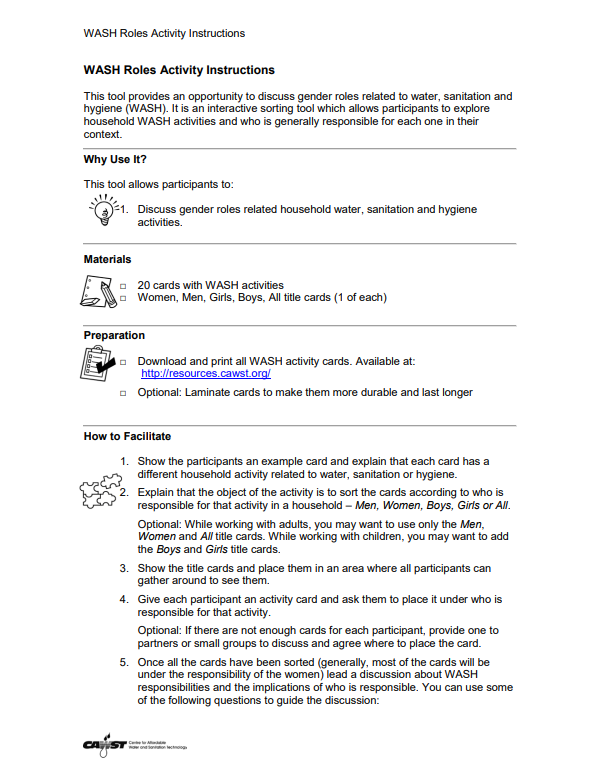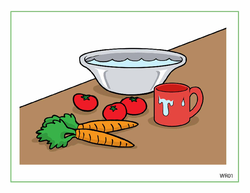Explore Gender and WASH
Implementing MHH Programs through WASH in Schools
This module highlights the importance menstrual health and hygiene (MHH) programs and facilities at schools.
Languages
English
French
Gender and WASH - Lesson Plan (CWP)
This lesson focuses on the differences between sex and gender. Participants will explore how gender is directly related to WASH. Participants will also discuss how gender affects their work as Community WASH Promoters.
Languages
English
Arabic
French
Spanish
Community WASH Promotion (CWP) Workshop
These workshop materials contain the resources for the Community WASH Promotion workshop. The role of the Community WASH Promoter is essential for the successful implementation of any household water treatment, sanitation, or hygiene (WASH) project. Through this workshop, participants will gain a clear understanding of the best practices for supporting community members in changing their behaviours of WASH practices with the aim of achieving improved community livelihoods.
Languages
English
Spanish
French
Arabic
Hindi
nt
Games and Activities
Use these activities and games to facilitate group understanding of water, sanitation, and hygiene.
Languages
French
English
Spanish
nt
Gender for WASH Trainers 1 Day Agenda
This one day Gender for WASH agenda discusses the gender roles involved in household water treatment
Languages
English
French
Spanish
Gender for WASH Trainers Workshop Report Template
This is a template of how to display the results of your final evaluations
Languages
English
French
Spanish
Gender for WASH Participant List Template
This is a template for recording workshop participants
Languages
English
French
Spanish
Gender for WASH Final Evaluation Summary
This is a template of how to display the results of your final evaluations
Languages
French
English
Spanish
Discussion Questions Presentation (Gender)
This presentation provides discussion questions about gender (Designed for Lesson Plan 3 in the Gender for WASH Trainer Manual)
Languages
French
Spanish
English
HWTS Implementation Framework Presentation (Gender)
This presentation shows the HWTS implementation diagram
Languages
French
English
Spanish
Gender and Sex Definition Presentation (Gender)
This presentation describes the difference between gender and sex (Designed for Lesson Plan 3 in the Gender for WASH Trainer Manual)
Languages
English
Spanish
French
Bias Free Framework Presentation (Gender)
This presentation describes the bias triangle (Designed for Lesson Plan 2 in the Gender for WASH Trainer Manual)
Languages
French
Spanish
English
Gender for WASH Trainers Trainer Manual
This manual is for trainers who are interested in delivering training on gender and its role in WASH training. It includes lessons plans and guidance on training delivery.
Languages
English
French
Spanish
Gender and WASH - Lesson Plan (Intro to WASH Nepal)
This lesson classifies WASH activities by gender at the household and community level, describes the relationship between gender and WASH, and explains how to create gender balance in WASH-related activities at the household level.
Languages
English
Overcoming the Gender Barrier: Engaging Indigenous Kichwa Women to Lead WASH Programming in Ecuador - Online Training
Facilitated by Deborah Payne (MPH and Director of Health Education for MedWater). Indigenous women in Ecuador exist within a patriarchal system that largely defines their experience as women. Kichwa women follow traditional roles in the household, preparing food, raising children, and serving as water managers. Fundacion MedWater, a non-governmental organization serving in the Amazon, has developed standards for engaging women in water and sanitation management and operations. This process has both improved the design of programming for the organization as well as improved specific WASH outcomes in communities.
Languages
English
Gender Roles Activity Instructions
These instructions explain how to facilitate the water, sanitation and hygiene gender roles activity with a group of people.
Languages
French
English
Spanish
Gender Roles Activity
This document includes the gender roles activity and instructions for facilitating the activity. The gender roles activity is a participatory tool to help a group of people to discuss gender roles related to water, sanitation and hygiene (WASH).
Languages
English
French
Spanish
Gender for WASH Trainers Workshop
This collection contains the resources for both trainers and participants for the Gender for WASH trainers workshop. This one day workshop is designed for people who facilitate Gender workshops in the WASH sector. The workshop reviews power and privilege, sex vs. gender and gender and WASH.
Languages
French
English
Spanish
About CAWST
CAWST is a Canadian charity and licensed engineering firm. We address the global need for safe drinking water and sanitation by building local knowledge and skills on household solutions people can implement themselves.

